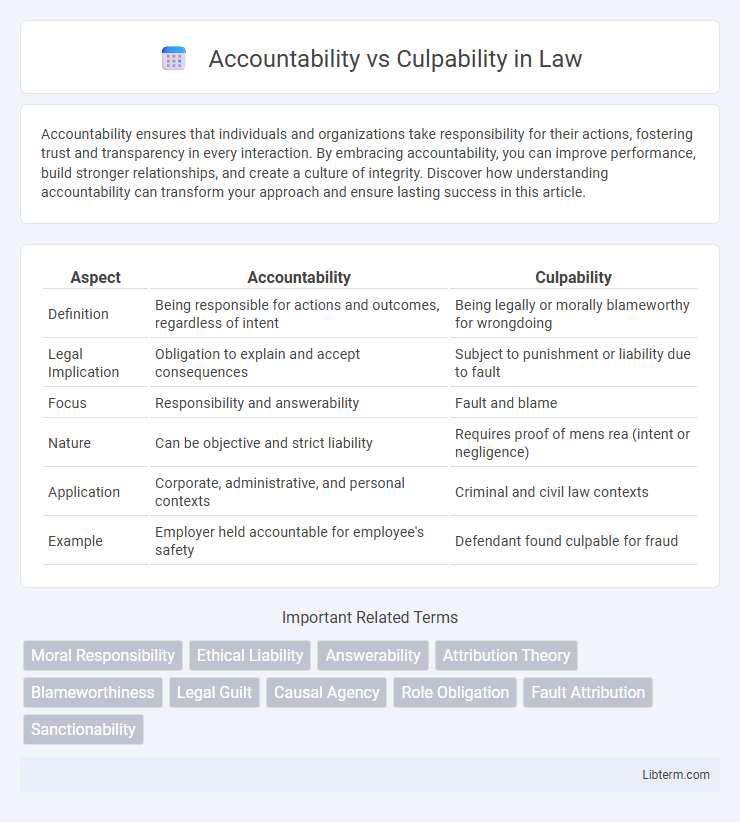Accountability ensures that individuals and organizations take responsibility for their actions, fostering trust and transparency in every interaction. By embracing accountability, you can improve performance, build stronger relationships, and create a culture of integrity. Discover how understanding accountability can transform your approach and ensure lasting success in this article.
Table of Comparison
| Aspect | Accountability | Culpability |
|---|---|---|
| Definition | Being responsible for actions and outcomes, regardless of intent | Being legally or morally blameworthy for wrongdoing |
| Legal Implication | Obligation to explain and accept consequences | Subject to punishment or liability due to fault |
| Focus | Responsibility and answerability | Fault and blame |
| Nature | Can be objective and strict liability | Requires proof of mens rea (intent or negligence) |
| Application | Corporate, administrative, and personal contexts | Criminal and civil law contexts |
| Example | Employer held accountable for employee's safety | Defendant found culpable for fraud |
Understanding Accountability and Culpability
Accountability refers to the obligation to explain, justify, and take responsibility for actions, emphasizing transparency and answerability within personal or professional contexts. Culpability, on the other hand, centers on the degree of blame or fault assigned to an individual for misconduct or wrongdoing, often linked to legal or moral judgment. Understanding accountability involves recognizing duties and consequences, while understanding culpability requires assessing intent and negligence behind actions.
Defining Accountability: Scope and Significance
Accountability encompasses the obligation to answer for actions, decisions, and outcomes within organizational or personal contexts, emphasizing responsibility rather than fault. Its scope includes transparent reporting, ethical conduct, and ownership of results, which fosters trust and improves performance in business, governance, and leadership. Understanding accountability's significance highlights its role in driving proactive behavior and ensuring stakeholders' confidence, distinct from culpability that solely addresses blame and legal liability.
Culpability: Meaning and Legal Implications
Culpability refers to the degree of blameworthiness or fault attributed to an individual for a wrongful act, often determining the severity of legal consequences. It involves evaluating intent, knowledge, negligence, or recklessness in committing an offense, which directly influences criminal liability and sentencing. Legal implications of culpability include establishing mens rea, shaping defenses, and impacting judgment in both criminal and civil law proceedings.
Key Differences Between Accountability and Culpability
Accountability refers to the obligation to explain, justify, and take responsibility for one's actions or decisions, emphasizing answerability regardless of fault. Culpability involves the degree of blameworthiness or guilt assigned based on wrongful or negligent behavior leading to harm or failure. The key difference lies in accountability's focus on responsibility and transparency, while culpability centers on fault and moral or legal blame.
Accountability in the Workplace
Accountability in the workplace involves employees taking responsibility for their actions and outcomes, ensuring tasks are completed efficiently and goals are met. It fosters a culture of trust and transparency, where team members own their roles and contribute to organizational success. Holding individuals accountable improves performance, encourages proactive problem-solving, and aligns efforts with company objectives.
Culpability in Legal and Ethical Contexts
Culpability in legal and ethical contexts refers to the degree of responsibility attributed to an individual for a wrongful act, often determining the severity of punishment or moral judgment. It involves establishing intent, knowledge, and recklessness, differentiating between intentional harm and negligent actions. Legal systems use culpability to assign liability and ensure justice, while ethical frameworks assess moral blameworthiness and guide personal or organizational accountability.
Shared Responsibility: Overlap Between Accountability and Culpability
Accountability and culpability overlap significantly in contexts of shared responsibility, where multiple parties contribute to an outcome. While accountability involves the obligation to report, explain, and be answerable for actions or decisions, culpability specifically addresses the degree of blameworthiness or fault in causing harm or failure. In organizational settings, clarifying the boundaries between these concepts ensures fair attribution of responsibility and enhances transparency in managing risks and errors.
Real-World Examples: Accountability vs Culpability
In corporate finance, accountability refers to a manager's responsibility to ensure accurate financial reporting, whereas culpability implies blame for fraudulent activities, as seen in the Enron scandal. In healthcare, a surgeon is accountable for patient care outcomes but culpable only if negligence is proven, illustrating how legal and ethical standards differentiate the two. In environmental regulation, companies may be held accountable for compliance with laws but deemed culpable when willful violations cause ecological damage, such as the Deepwater Horizon oil spill.
The Impact of Accountability and Culpability on Organizational Culture
Accountability in organizational culture fosters transparency and encourages employees to take ownership of their actions, leading to improved performance and trust within teams. Culpability, by emphasizing blame and fault, can create a culture of fear and defensiveness, hindering open communication and collaboration. Balancing accountability with fair evaluations of culpability promotes a positive work environment that drives innovation and continuous improvement.
Fostering Accountability Without Assigning Undue Culpability
Fostering accountability involves creating a culture where individuals take responsibility for their actions and outcomes, promoting transparency and continuous improvement. Emphasizing clear expectations and constructive feedback helps distinguish accountability from culpability, avoiding the negative effects of blame or punishment. Organizations that focus on learning and growth rather than assigning undue culpability enhance motivation, trust, and overall performance.
Accountability Infographic

 libterm.com
libterm.com